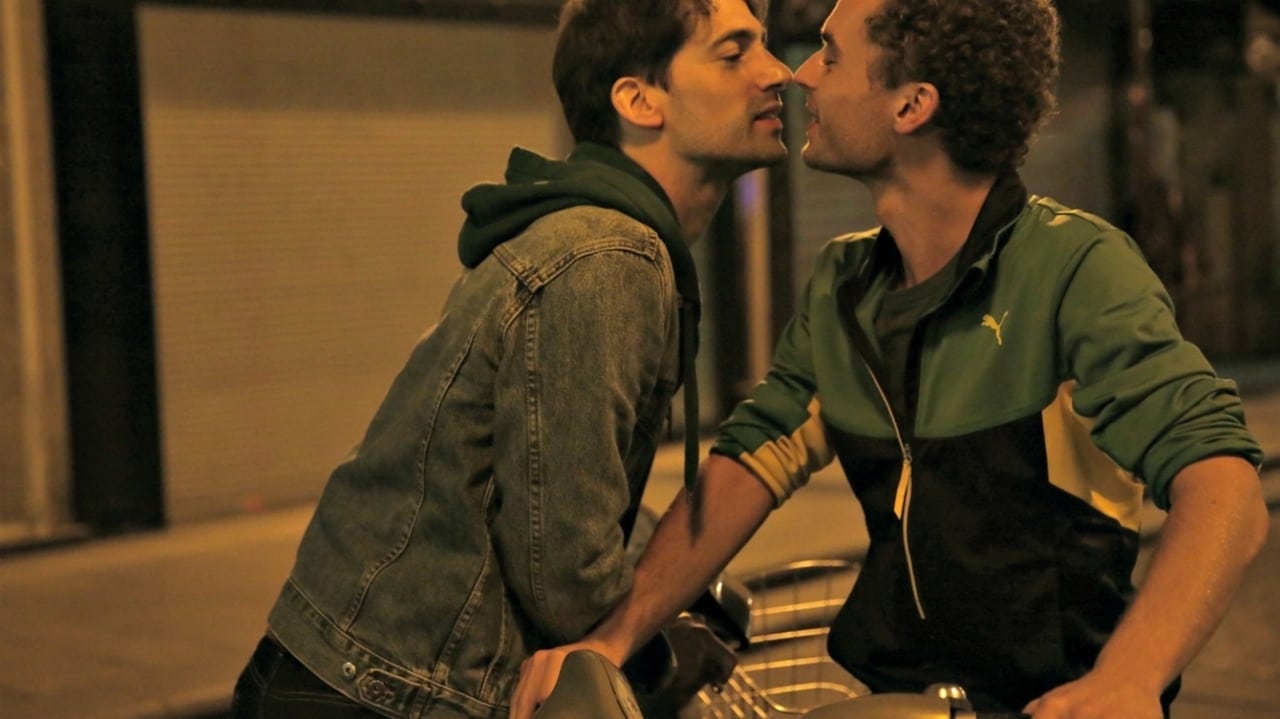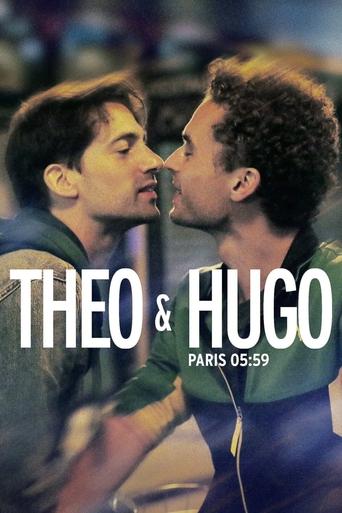

I found this movie by chance from a movie magazine. I must say that I was expecting an average movie on gay issues. It was also in Paris and it might be interesting. The movie started with very real scenes from a sex bar in Paris (probably L'Impact). After sex bar scene, movie too all my heart, all my thoughts. As a gay guy who lived in Paris and experienced the similar scenes, I can say that none of movies can depict a love, a romance and a gay life like "Theo and Hugo" depicted. Hesitations between men for a possibility to start an affair, the desire between men, the atmosphere of sex bar, the feelings, walking lonely Paris streets as two guys, stopping in a kebab restaurant (Tarkan's song was in the background), dialogues... unbelievable... It was not like a movie.. it was like a real scenes... If you skip all gay stuff, it is a very beautiful story of a romance... very naive, very innocent...Olivier Ducastel, Jacques Martineau must be congratulated also the players Geoffrey Couët, François Nambot. They all have done a great work. What I lived (incl. HIV+ stuff) when I was in Paris some time ago was exactly was in the movie. No exaggeration, no decoration... the movie streams like La Seine... peacefully, perfectly and glamorously. Thank you guys!
... View MoreThe title characters in "Théo et Hugo dans le même bateau" meet in a dark room and connect instantly. Then they stroll the streets of early morning Paris together. From its raunchy, explicit beginning, this charming film evolves into a sweet and somber romance, echoing of Richard Linklater's "Before Sunrise"-trilogy. Consequently, Théo's and Hugo's story comes across an unforgettable and ultimately very charming affair.
... View MoreFrench queer filmmakers Olivier Ducastel and Jacques Martineau's seventh feature, Paris 05:59: THÉO & HUGO alludes as much to Agnès Varda's CLEO FROM 5 To 7 in its relation to the real-time plot device, as to Richard Linklater's BEFORE trilogy, where two individuals are trying to build something intimate and meaningful through small talks in a spontaneously perambulating pace. But, as a testimonial to the filmmakers true grits, the film takes a bold and sensational initiative to instantaneously put off the prudish and conservative alike, by kicking off the movie with a lurid hardcore sex orgy inside an iridescent bar through the eye of a predator seeking his preys, and then setting its focal point to our two titular protagonists struck by coup de foudre and beginning to consummate their libidinous thrusting in the accompaniment of trippy beats and day-glo lights, but with a consequence, which Ducastel-Martineau duo tactfully explores as the brunt of what happens later that night when they exit together from the bar at 04:47 A.M.The film does a cracking job in establishing the "sex first, love later" scenario in a post-AIDS 21st century, when carnal impulse receding, the two strangers, both are satisfying with their physical encounter, make tentative steps to know each other from the scratch, and their bonhomie hits a halt when a felix culpa pans out, and the duo must re-connect their rhythm and re-consider their possible future within an approximate one-hour time-line as the film finishes precisely at 06:00.More often than not, a film hyped by unsimulated sex sequences would suffer from being made light of its less grandstanding elements, for example, Ducastel-Martineau duo's apt punctuation of commentaries concerning those socially marginalized: a hospital devolves the night shift to its distaff employees, homophobia vituperation pelted to the sexuality minority, a Syrian immigrant's perspective on freedom and a senior chambermaid's impromptu babbling (and a resultant blooper for the sharp-eyed), all add a touch of political angel but never overstay their welcome.The two leads are giving a wholesomely winning and empathetic performance (if it sounds like an understatement after their corporeal sacrifice of leaving nothing to imagination), Geoffrey Couët inhabits a somewhat rustic complexion into Théo's wide-eyed-ness, and François Nambot as Hugo, often takes the lead in their conversation with his youthful urbanity and amiability, a smitten, can-do spirit has no affectation and pretension, which makes the ineffable ending such a boon to be appreciated, not just for their hard-earned chance, but also for Ducastel-Martineau's ingenuity and seeming effortlessness (a keen eye of a nocturnal locus under the unadorned lighting arrangement) of conjuring up something extraordinarily honest, heartfelt and aesthetically arresting out of an ordinary story arc, it is never too soon to signpost this film as the new landmark in today's ever-progressive queer cinema-scape, because the battle hasn't been (completely) won yet.
... View MoreBeing of a certain age this may well be the last true ground-breaking masterpiece that I may see in my lifetime. It is a bookend as it were to another masterpiece, Louis Malle's 'Les Amants'. I saw this when it first came out in 1958. And there are similarities. Both films for their respective times have pushed the boundaries of eroticism in cinema and both have lovers who have met the same day and ended that day with the dawn of their future together. There has been comparison with Agnes Varda's 'Cléo de 5 à 7' but this is only partially relevant, because sexuality does not seal the whole basis of that film. Jeanne Moreau and Jean-Marc Bory fall in love in an 'instant' and that same 'instant' happens to the men in 'Theo et Hugo dans le meme bateau'. Brahms does not overlay this passion, but pounding modern pop music does. It is the music of our time. In both films there are challenges ahead, and both passions may be destroyed by them. What makes this film great along with the Malle is the element of risk that is taken in choosing to follow the path of desire, and truths are said in 'Theo et Hugo' which censorship would not have permitted the lovers in 'Les Amants'. I was amazed at the words and actions in the last extraordinary scene that reveal how love can be born out of the realisation that the sexual organ of the beloved can be loved for itself and is an important component of that love. That in this film it is the male penis that is kissed and adored by the lover will be a sight of revulsion for some, a wonder and a revelation for others. This film like the Malle is deeply Romantic in the highest sense of the word. Instead of the beauty of the night world of the surrounding country side, compared to 'Caspar David Friedrich' and his paintings, in the beautifully filmed 'Les Amants' we have in 'Theo et Hugo' the magically lit streets of Paris, deserted in the early hours of the morning. This is not the Paris of Hollywood, but the ordinary streets around such areas as Stalingrad and Anvers. Places of urban peace where the two characters can explore the dilemma they are in, fight off love and then accept it quite simply because it has happened. I do not want to elaborate on the HIV aspect, because to me it seemed the rock of fate that has to be somehow overcome, just as the adultery and the leaving of a child has to be overcome in 'Les Amants'.As I have said this is a great film and it saddens me that perhaps so many will not see it, as I believe its audacity, its beauty, its infinite gentleness between two men, will put it there in the Pantheon of films to stand the test of time. Maybe in future years it will be seen as the mountain peak in French cinema that it is.Unlike some reviewers I think the actors are equal to each other, and in the final scene with its extraordinary intimacy there is a look of bewildered but enchanted delight of Geoffrey Couët's face that surpassed acting. He embodied the giving of love, and that is rare in any film. What he accepted with a look of beauty few actors in the world would accept to do, and I hope he has a great future ahead of him. Theo in all his moods captured my heart, and François Nambot captured my mind that he could dare so much, and push for so much to happen between them. This film is a poem of love.
... View More